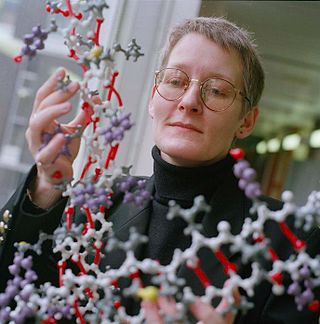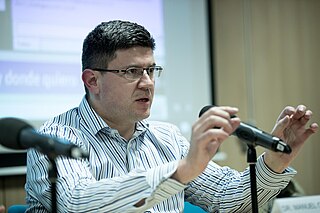
Bioinformatics is an interdisciplinary field of science that develops methods and software tools for understanding biological data, especially when the data sets are large and complex. Bioinformatics uses biology, chemistry, physics, computer science, computer programming, information engineering, mathematics and statistics to analyze and interpret biological data. The subsequent process of analyzing and interpreting data is referred to as computational biology.

The Department of Computer Science at the University of Manchester is the longest established department of Computer Science in the United Kingdom and one of the largest. It is located in the Kilburn Building on the Oxford Road and currently has over 800 students taking a wide range of undergraduate and postgraduate courses and 60 full-time academic staff.

The Biochemical Journal is a peer-reviewed scientific journal which covers all aspects of biochemistry, as well as cell and molecular biology. It is published by Portland Press and was established in 1906.

John Frederick William Birney is joint director of EMBL's European Bioinformatics Institute (EMBL-EBI), in Hinxton, Cambridgeshire and deputy director general of the European Molecular Biology Laboratory (EMBL). He also serves as non-executive director of Genomics England, chair of the Global Alliance for Genomics and Health (GA4GH) and honorary professor of bioinformatics at the University of Cambridge. Birney has made significant contributions to genomics, through his development of innovative bioinformatics and computational biology tools. He previously served as an associate faculty member at the Wellcome Trust Sanger Institute.
Semantic publishing on the Web, or semantic web publishing, refers to publishing information on the web as documents accompanied by semantic markup. Semantic publication provides a way for computers to understand the structure and even the meaning of the published information, making information search and data integration more efficient.

Carole Anne Goble, is a British academic who is Professor of Computer Science at the University of Manchester. She is principal investigator (PI) of the myGrid, BioCatalogue and myExperiment projects and co-leads the Information Management Group (IMG) with Norman Paton.
The myGrid consortium produces and uses a suite of tools design to “help e-Scientists get on with science and get on with scientists”. The tools support the creation of e-laboratories and have been used in domains as diverse as systems biology, social science, music, astronomy, multimedia and chemistry.
Mark Bender Gerstein is an American scientist working in bioinformatics and Data Science. As of 2009, he is co-director of the Yale Computational Biology and Bioinformatics program.

Robert David Stevens is a professor of bio-health informatics. and former Head of Department of Computer Science at The University of Manchester

UTOPIA is a suite of free tools for visualising and analysing bioinformatics data. Based on an ontology-driven data model, it contains applications for viewing and aligning protein sequences, rendering complex molecular structures in 3D, and for finding and using resources such as web services and data objects. There are two major components, the protein analysis suite and UTOPIA documents.
The BioCatalogue is a curated catalogue of Life Science Web Services. The BioCatalogue was launched in June 2009 at the Intelligent Systems for Molecular Biology Conference. The project is a collaboration between the myGrid project at the University of Manchester led by Carole Goble and the European Bioinformatics Institute led by Rodrigo Lopez. It is funded by the Biotechnology and Biological Sciences Research Council.

Robert Clifford Gentleman is a Canadian statistician and bioinformatician who is currently the founding executive director of the Center for Computational Biomedicine at Harvard Medical School. He was previously the vice president of computational biology at 23andMe. Gentleman is recognized, along with Ross Ihaka, as one of the originators of the R programming language and the Bioconductor project.
Utopia Documents is a semantic, scientific, web-enabled PDF reader that is part of the Utopia toolset. Utopia Documents can be downloaded for free.

Teresa K. Attwood is a professor of Bioinformatics in the Department of Computer Science and School of Biological Sciences at the University of Manchester and a visiting fellow at the European Bioinformatics Institute (EMBL-EBI). She held a Royal Society University Research Fellowship at University College London (UCL) from 1993 to 1999 and at the University of Manchester from 1999 to 2002.

Ross Donald King is a Professor of Machine Intelligence at Chalmers University of Technology.
Norman William Paton is a Professor in the Department of Computer Science at the University of Manchester in the UK where he co-leads the Information Management Group (IMG) with Carole Goble.

Toby L. J. Howard is an Honorary Reader in the Department of Computer Science at the University of Manchester in the UK. He was appointed Lecturer in 1985, and was Director of Undergraduate Studies in the Department 2011–2019. He retired from the University in August 2020 and took an Honorary position.
Enhanced publications or enhanced ebooks are a form of electronic publishing for the dissemination and sharing of research outcomes, whose first formal definition can be tracked back to 2009. As many forms of digital publications, they typically feature a unique identifier and descriptive metadata information. Unlike traditional digital publications, enhanced publications are often tailored to serve specific scientific domains and are generally constituted by a set of interconnected parts corresponding to research assets of several kinds and to textual descriptions of the research. The nature and format of such parts and of the relationships between them, depends on the application domain and may largely vary from case to case.

Christine Anne Orengo is a Professor of Bioinformatics at University College London (UCL) known for her work on protein structure, particularly the CATH database. Orengo serves as president of the International Society for Computational Biology (ISCB), the first woman to do so in the history of the society.

Manuel Corpas is an Anglo-Spanish biologist and entrepreneur known primarily for his contributions to the field of Bioinformatics and Genomics. Currently Corpas is Chief Scientist of Cambridge startup Cambridge Precision Medicine, a tutor at the Institute for Continuing Education at the University of Cambridge and a lecturer at the Universidad Internacional de La Rioja. Manuel worked on the human genome from the beginning of his career, being one of the first consumers to sequence and his own genome and that of close relatives, which he published as the Corpasome. He has held positions at the Earlham Institute as Project Leader, and the Wellcome Sanger Institute, developing the DECIPHER database, a database that aids in the diagnosis of patients with rare genomic disorders.













